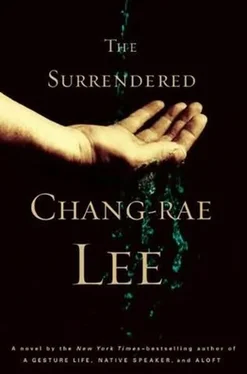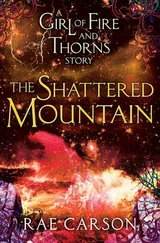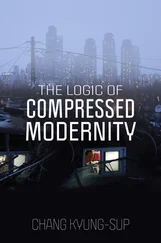Hector laid June on the bed next to the window, but she didn’t turn toward it, as if she had no desire to see the church, or had even forgotten why they had come. The young manager considered her gravely, and when Hector extended some lire for a tip he refused it, saying instead that he would fetch their bags. Hector pointed out their car, parked across the way, but couldn’t explain that it had just died.
“I wish Nicholas were here,” June said, after the manager had come back with their bags and then left once again. She was somewhat revived. She wanted to change her clothes, for some reason, rather than have him bear her immediately to the church on the hill. He didn’t say what he was thinking, which was that she might never leave the room, or at least leave it alive. They were finally here after the fitful sojourns of recent days-and now she would devote precious minutes to this? But he didn’t protest.
She said, “He would have liked this place.”
“You think so?”
“He was always an artistic boy. He would have liked the landscape here. The colors and the hills, just like in the art books he used to look at. All the cypress trees.”
Hector was surprised, wondering when she might have noticed.
“I don’t much like those trees.”
“No? Why not?”
“Makes me think of cemeteries.”
June nodded, waiting as he unpacked her bag to look for the pieces of clothing she wanted. “Of course you’re right,” she said, almost able to smile.
“Are these the ones?” he asked her, holding up the things she’d asked for from her bag. An outfit constructed from a stiff, coarse white linen.
“Yes.”
He placed them on her bed. June explained to him that the outfit wasn’t a traditional death robe exactly, except for the fact that it was white. The mourners would wear white as well.
“I don’t have any clothes like that,” he said.
She laughed weakly. “You’re not going to mourn me, so what does it matter?”
He didn’t answer. Back in the car she had told him what to do with her after she was dead: she should be cremated and then her ashes spread about the grounds of the church, or perhaps even snuck inside, dispersed however and wherever he saw fit. She joked that he might perhaps prefer to do the job himself, though following the old manner, swathing her body in cotton dressings and then building a wooden bier on which to set her aflame.
“Do you think we should have had Nicholas come with us?” she said, now lying on her side, her head propped on two pillows.
He peered into her eyes to see what she was thinking or could possibly be hoping for now. But there was only flatness in her gaze, an unfocused stare, as though she were looking upon a shape more looming than defined. What she believed or wanted to believe, he couldn’t tell anymore.
He said, “It’s better that he stayed back in Siena.”
“Yes. You’re probably right. What would he do here? Except I was thinking just now that perhaps he might have wanted to spend more time with you.”
“I doubt that.”
“Why not?”
“I don’t think he took to me much.”
“How could you tell?”
“It wasn’t hard.”
“Did you take to him?”
He didn’t answer, for although it was obvious how she hoped he would reply, he couldn’t bring himself to say anything good about “Nicholas.” In fact, this renewed mention of the fellow was making his chest pound, his fists ache. On the road he had scolded himself for not beating him to within an inch of his life. And now he wished that he could have met the other Nicholas, her true son, and his, if even for just a few minutes, not for any longing or want of a bond but simply so he could say something that wouldn’t be such a burning, raging utterance. To simply greet the boy. So he pictured the old school photograph of Nicholas, the color washed out, yellowed, his long hair parted in the middle, framing an expression that was more a question than a statement, as though he were waiting for some long-hoped-for instruction.
“Maybe I could have,” he said. “But it would have taken a long time.”
“Doesn’t everything?”
He nodded, startled by this seeming flash of lucidity. He had unpacked the rest of her clothes and put them into the armoire and begun emptying his own small satchel when he saw the book that he’d forced Nick Crump to hand over to him in Siena. He couldn’t bear to handle it and had immediately thrust it beneath his clothes. But earlier, at a rest stop, while she was napping, he couldn’t help himself and had peered once more into the book. It was the same, except that the cloth of its cover had been burned away, its pages made brittle by the trauma. He noticed two inscriptions on the title page. The first, to Sylvie, he recognized from all those years before; the second was in a different hand, the ink newer: To Nicholas, my dearest wayfarer. May you find great treasure and riches. He was confused as to how June had come to possess it, whether it had been singed in the terrible fire, and how, if so, it had ever survived. But like a promise of ill reckoning, the scent of smoke that rose up from its binding quickly quashed his questions and he had pushed it back into his bag.
Now he gave the thin volume over to her, the thing literally falling apart in his hands. When June took it he could see her fingers straining against it, as if she wanted to press it back to life. She opened the book and turned its first pages to a photograph of the author, a young-looking man with muttonchops and a gold watch chain on his suit vest. Opposite was the title page, twice inscribed, as he’d seen, and June seemed to linger on the handwriting, her expression one of confusion. Finally she caressed the page as if it were the cheek of an infant. With hardly any difficulty she stood up before the large window, her hands braced against the wide marble sill. In the framed vista the church at the top of the hill gleamed in the late-afternoon sun, the rising gravel path darkly ribbed with the long shadows of the cypress trees, and though it must have been the first time she’d seen it her eyes only narrowed coldly while taking its measure, her gaze no pilgrim’s.
“I didn’t mean for him to be alone in the world,” she said. “Not forever, anyway. I thought it would be good for him to get away from me. Not to depend on me. But I haven’t asked you. Was he still angry with me? I mean to say, did it seem to you that he had forgiven me?”
“Forgiven you for what?”
“I told you,” she said, wrapping the book with her arms. She looked strong all of a sudden, her posture as straight as when she was a child, her chin forward, elevated. That orphan girl, carved from rock. For a long second, when she turned back to look at him, she appeared as if she might not be ill at all.
“Didn’t I? When he was injured in England while riding. After the hospital called. I waited until I got a postcard from him. In the end it was okay but I keep asking myself why I didn’t try to reach him right away. I wanted to talk to him so much. I wanted to see him. It had been many years. I could have told him I’d fly right over and be with him. But for some reason I just passed the hours. I opened the shop the next day. I went to dinner by myself. For two weeks I didn’t sleep. Then his postcard came and after that the nice letters, and it seemed that he cared about me again, but I’ve been thinking it was only because he was angry for so long that he ended up being kind. Do you think that can happen? Do you think that’s what happened to my son?”
She then stepped back from the window and sat down on the bed, her head heavy and bent, all the girding of the prior moment now fled from her body. She set the book aside on the bed beside her. He asked her if she wanted to change now into the special clothes.
Читать дальше











